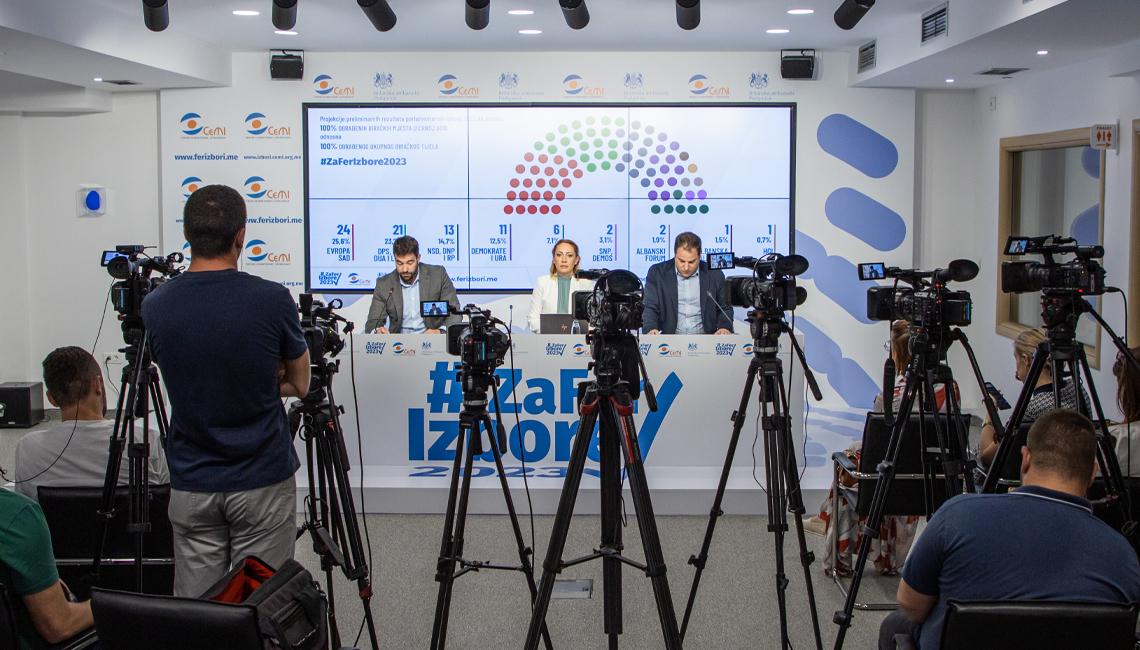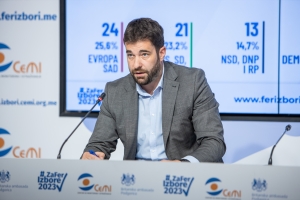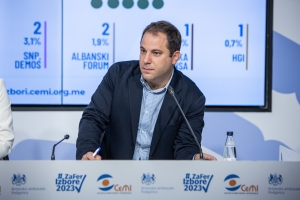Parliamentary elections were conducted in compliance with general democratic standards and principles, while the election day passed peacefully and without major irregularities, with the lowest turnout ever recorded in Montenegro. The election administration generally effectively managed the election process, while the problem of an unorganized voter list remains pronounced. The campaign was moderate, with emphasized elements of a negative campaign in the finish, a pronounced official campaign, as well as widespread abuse of state resources.
This was announced at the press conference of the Centre for Monitoring and Research (CeMI) on the occasion of the presentation of a report on preliminary conclusions and findings "Citizen monitoring of parliamentary elections 2023".
The CEO of CeMI, Ana Nenezic, said that the election day passed in a peaceful atmosphere, and that the nature and scope of the irregularities did not threaten the regularity of the overall election process.
"The character of the irregularities is uniform in relation to the majority of previous election cycles and to the greatest extent relates to the violation of the secrecy of voting and the misuse of technology in order to publicly present the expressed will of the voters," said Nenezic.
She pointed out that the elections were conducted without major problems in the organization, while the fundamental rights of candidates and voters, to freely present their programs, i.e. to exercise their right to vote, were mostly respected.
"The elections were held according to the rules of the unreformed set of election laws, which contain numerous legal gaps, ambiguities and collisions of legal norms that open up space for their abuse and reduce efficiency. "The previous recommendations of CeMI were not respected, and most of the observed irregularities in the application of the current legal framework were repeated during this election cycle," said Nenezic.
The head of the Legal Department of CeMI, Ognjen Mitrovic, said that the authorities for the implementation of the elections, for the most part, effectively conducted the election preparations and complied with most of the legal deadlines.
"Although the overall election process was basically transparent, CeMI, as well as other domestic and international observation missions, were not involved in the work of the institutions and authorities for the implementation of the election process, and had limited insight into the process and the accompanying documents election process," Mitrovic said.
In CeMI, they assess that observation missions should be included, from preparatory election activities to the conclusion of the election process, in order to ensure full transparency and contribute to full information of citizens on all details of the election process.
"All Montenegrin citizens who have reached the age of 18 have the right to vote, provided that they have resided in Montenegro for at least 24 months prior to election day. However,
The State Election Commission (SEC) held 44 sessions from the day the early parliamentary elections were announced until June 11. The SEC regularly publishes all decisions, the agenda of the sessions and the minutes from the same on its official website," said Mitrovic.
According to him, the part of the SEC that should be especially praised are the members selected in the competition, and the Expert Service of the SEC, which showed a high level of professionalism and openness to cooperation with non-governmental organizations.
"The State Election Commission determined and announced the preliminary election results in accordance with the legal deadline. "The results were determined without the voting of the members of the Commission, as was the case in the previous election processes," Mitrovic said.
He indicated that the campaign was marked by three clearly distinct phases: the first phase of a possible postponement of the election, which ended with the expiration of the deadline for submitting electoral lists on May 16, the second phase of a moderate campaign until the last days of May, and the third phase of an aggressive campaign in the last two weeks of the campaign.
"The campaign was competitive, but insufficient in content and with emphasized elements of a negative campaign in the end, which could influence the decision of the voters. Accusations by the paper holders, serious content, without a statement from the competent institutions in relation to the character of the accusations, along with the abuse of the institutions of the system and the position of power, are a bad example and should be limited so that they cannot influence certain voters," said Mitrovic.
The head of the department for public policy research at CeMI, Milos Vukanovic, said that 3,159,104 euros were allocated for the purpose of financing the election campaign.
"Compared to the year 2020, when the allocated budget funds amounted to 2,367,805 euros, there is an obvious large increase in budget contributions for the campaign," stated Vukanovic.
He explained that the Law stipulates that the aforementioned funds are distributed in such a way that funds in the amount of 20 percent are distributed in equal amounts to political entities, within eight days of the deadline for submitting electoral lists, while funds in the amount of 80 percent are distributed after the election to the political subjects who won the mandates, in proportion to the number of mandates won.
"As 15 lists were confirmed for this election, each of them received 42,121 euros. "As the law does not provide for sanctions for not achieving the minimum required number of votes for the newspapers that received funding, the public once again resented it, accusing certain parties of entering the election race with the aim of making a profit," said Vukanovic.
He pointed out that all 15 political subjects opened separate giro accounts, and 13 of them submitted fifteen-day reports on the contributions of legal and natural persons within the legal deadline.
"ASK has limited powers in the part of control of spent funds and the legal framework for the financing of parties and election campaigns, and the abuse of state resources, as well as the prescribed control powers of that institution, must be improved, because they do not provide a basis for the implementation of essential control," stated Vukanovic.
He pointed out that during the election cycle a particularly high rate of employment of persons in the public sector was noted, stating that during the campaign period the ASK noted 5518 employment contracts, not counting public companies because the law still does not provide for the provision of information on employment during the election campaign in economic companies whose founder and/or majority or partial owner is the state or local self-government unit.
"Expenditures for social benefits increased during the election campaign to 26 million euros, while in the other four months of this year (January, February, March and May) they ranged between 16 and 20 million euros." "Additionally, 1,013 decisions were made that allocated and paid funds from the current budget reserve in the total amount of 5,365,423 euros," said Vukanovic.
He stated that, from the current budget reserve, the Ministry of Finance and municipalities paid a total of 786 one-time grants in the total amount of 882,021 euros, while the municipalities separately paid 236 social grants in the total amount of 74,558 euros.
Speaking about media coverage during the parliamentary elections, Nenezic said that the media environment is competitive, with a large number of registered media, and that the public broadcaster complied with the legal prerequisites and offered balanced coverage of the campaign.
"However, the outdated approach of presenting 15 lists and coalitions, with a short limited time, without the possibility of substantial cross-arguments, is not enough for citizens to receive all the necessary information in order to make an informed decision," Nenezic said.
She pointed out that the private media organized presentations and debates within a limited framework, with those lists that they aimed to present for the sake of attractiveness of the program, or due to the favoring of certain political entities.
"Although legitimately, this approach does not provide equal space to all actors of the electoral process and puts certain subjects in a privileged position, CeMI recommends to consider the way of presenting electoral lists and coalitions, in accordance with the best international practices, in order to ensure an equal chance for all actors to I will present my program to the voters," said Nenezic.
According to her, a total of 3,961 media reports were published.
"Web portals had the largest share in reporting on the parliamentary elections in 2023 with a cumulative 2,830 media reports or about 71 percent of the total media material placed, that is, recorded." They are followed by television with 780 media reports," said Nenezic.
Speaking about the election silence, Nenezic said that the propaganda of political parties through social networks came to the fore.
"The most important reason for this is the inconsistency of the solutions in the relevant laws, i.e. The Law on the Election of Councilors and Members of Parliament (election propaganda lasts until 24 hours before the day of the election) and the Law on the Financing of Political Entities and Election Campaigns (election propaganda lasts until the day of the election). In relation to traditional, as well as online media, the rules of media advertising of political parties were respected during the pre-election silence, and there was no political content in which the symbols and slogans of political parties stood out", explained Nenezic.
She pointed out that due to a number of factors, such as the weaker election result of some electoral subjects and the distribution of women on the electoral lists, according to the current schedule of mandates, the participation of women in the Montenegrin parliament will be significantly less than it was immediately before the elections.
"Thus, 17 women deputies (20.98%) will enter the Parliament, which is significantly less compared to the two previous convocations. In this way, the representativeness of women in the Montenegrin parliament falls below the world average, which according to the latest data is 24.6%. The percentage representation of national parties of minority peoples in Parliament after these elections will be 12.34%, which is a significant increase compared to 4.93% in 2020 and 2016," Nenezic said.
According to her, the electoral system places members of the Roma in an unequal position, who do not have equal status with members of the minority community, which participates in a similar percentage in the total population.
"The system of differential legal censuses, which gives minorities a privileged position, contains illogicalities, which can lead to an effect that is in disagreement with the concept of positive discrimination of minority peoples," said Nenezic.
She said that on the basis of projections based on a representative sample consisting of 400 polling stations in Montenegro, CeMI came out with the first assessment of the results at 20 hours and 45 minutes, and that after that citizens had the opportunity to follow the filling of the sample.
"Additionally, CeMI conducted a parallel counting of votes and published projections of preliminary results based on 100% processed polling stations in Montenegro and 100% processed total electorate during the election night, on the website, application ferizbori.me, and on its social networks". Nenezic said.
She explained that the average deviation of the percentage of votes obtained by political parties on the total population of voters was almost identical to the data determined by the State Election Commission for preliminary election results.
"The average absolute error in the estimation of the votes won was 0.03%." "The allocation of mandates is the same as that established by the State Election Commission, that is, there was no deviation of the assessment in relation to the data communicated by that institution," Nenezic concluded.
The project Civilian monitoring of parliamentary elections in Montenegro 2023 was supported by the British Embassy in Podgorica.





